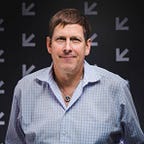SXSW Startups: Bluefield Fights Methane
The Forrest Four-Cast: January 17, 2018
At the 2018 SXSW Accelerator Pitch Event in Austin, 50 startups from across 10 categories will dazzle live audiences with their pitches before a panel of industry experts. Half of these startups will pitch on Saturday, March 10 and the remaining 25 will pitch on Sunday, March 11. Winners from each of the 10 categories will be honored at the Accelerator Award Ceremony at 7 pm on Sunday, March 11 at the Hilton Austin. The SXSW Accelerator Pitch Event takes place within the Startup & Tech Sectors track of programming.
Bluefield is one of the five finalists in the “Enterprise and Smart Data Technologies” category and is slotted to pitch at 12:30 pm Saturday, March 10 in Salon AB at the Hilton Austin. This Palo Alto, Calif.-based outfit aims to address climate-wrecking methane leaks that aren’t detected and controlled, putting hundreds of billions of dollars in investments at risk. Its micro-satellite-based methane sensors and AI-enhanced analytics will deliver data that energy companies need to profit from fighting climate change.
What are the overall goals for Bluefield for 2018?
We’re scheduling multiple airborne demonstrations of our proprietary methane sensor with oil and gas companies — as well as environmental regulators — throughout 2018. Our goal is to showcase the truly disruptive potential of our approach, book our primary customers, and build a space-ready sensor for our microsatellites.
What inspired your team to apply for SXSW Accelerator?
SXSW has become so much more than a music festival. It’s a place to share ideas about building a better future — and SXSW Accelerator is absolutely emblematic of that. We think that making climate action profitable is essential to any future worth living, so we felt that this would be a fantastic opportunity for us to connect with collaborators that share our vision.
What session is your team most excited about attending at SXSW 2018?
“The Future of Energy Is Everyone’s Business” — a great title for a really important conversation. Every single person in the world (not to mention every startup!) needs the future of energy to be both low-cost and climate-friendly, and the combination of big energy, big data and tech-savvy environmentalists on the panel should make for a fascinating session.
What is your competitive advantage?
Our combination of global scale in coverage and precision in detecting methane emissions is unique. Aerial or ground-based companies can survey a specific area of a pipeline system or gas production site, but from space we can monitor the entire planet. And compared to other satellites that monitor greenhouse emissions, we offer far greater accuracy and a resolution measured in meters, not kilometers — precise enough to enable companies to detect and fix leaks quickly and profitably.
Looking at the entire tech industry, what trend does your team think is most underrated at present?
It’s a lot less sexy than blockchain, but the revolution in low-cost, small-scale micro-satellites — and the incredible ecosystem of new companies using them to deliver datasets that would have been unimaginable just a few years ago — will provide much more substantial benefits in both the near and the long term.
What podcasts does your team listen to and why?
The Energy Transition Show and The Interchange provide ultra-detailed, big-picture deep dives on energy and climate issues that warm the geekiest corners of our hearts. And No Place Like Home and Warm Regards, our favorite climate change podcasts, always help to remind us why we’re so invested in our mission.
Have team members previously been involved with other startups?
Our founder and CEO Yotam Ariel previously founded Bennu Solar, a startup that brought modern electricity to tens of thousands of off-grid villagers in Africa. It was an incredibly eye-opening experience of how disruptive new technologies (solar in this case) can provide better environmental and economic energy outcomes than incumbent solutions. We’re hoping to do the same for “Big Energy” with the help of micro-satellite technology, which can provide much more effective and profitable emissions analytics for oil and gas companies than existing air- or ground-based approaches.
What does the startup experience teach about life?
Nobody can stop you except yourself.
Person, company, thing or goal. What inspires your team to work harder?
Our goal, absolutely. Methane is responsible for a quarter of the global warming we’re already experiencing, and cutting methane emissions could provide half of the actions needed to avoid catastrophic climate change. We’re building a data platform to make those climate-saving investments possible and profitable — what could be more motivating than that?
Look for interviews with more SXSW Accelerator finalists at this space between now and March.
Or, click here to browse the full lineup of startups for SXSW Accelerator 2018.
Hugh Forrest serves as Chief Programming Officer at SXSW, the world’s most unique gathering of creative professionals. He also tries to write at least four paragraphs per day on Medium. These posts often cover tech-related trends; other times they focus on books, pop culture, sports and other current events.
